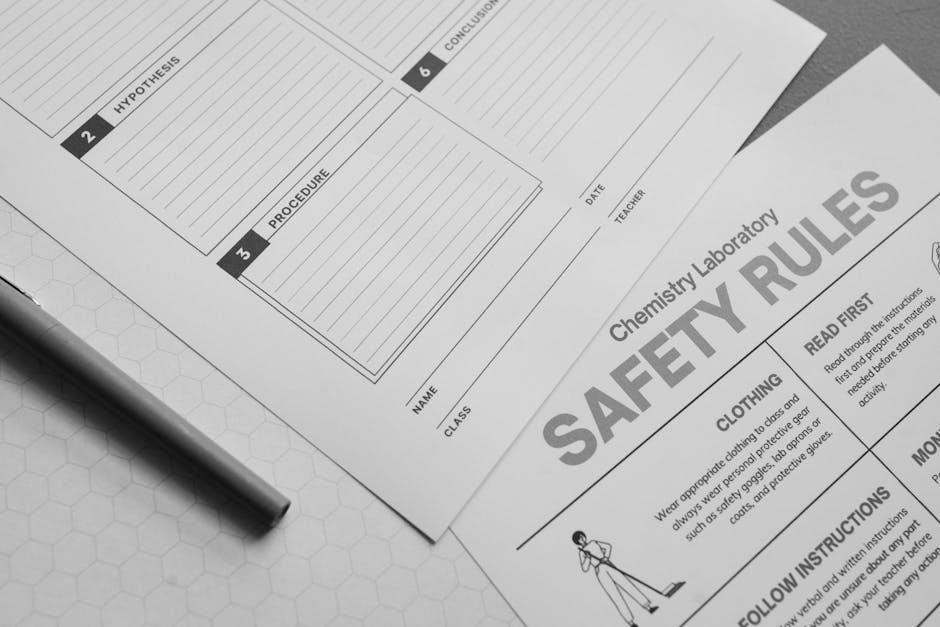Chemistry is the study of matter and its transformations, exploring the building blocks of our universe. It reveals how substances interact and change, shaping our daily lives through practical applications and innovations, with resources like Lessons in Chemistry PDF offering foundational knowledge and hands-on activities for learners.

Overview of Chemistry as a Science
Chemistry is the scientific study of matter, energy, and their interactions, focusing on the composition, properties, and transformations of substances. It is a fundamental science that underpins understanding of the physical world, from the molecular structure of materials to the reactions that drive life processes. Chemistry employs systematic methods of observation, experimentation, and analysis to develop theories and laws. It is divided into branches such as organic, inorganic, and physical chemistry, each exploring distinct aspects of chemical phenomena. Practical applications of chemistry are vast, influencing fields like medicine, technology, and environmental science. Educational resources, such as Lessons in Chemistry PDF, provide structured learning materials to introduce core concepts, experiments, and problem-solving techniques, making chemistry accessible to students of all levels.
The Importance of Chemistry in Everyday Life
Chemistry plays a vital role in everyday life, influencing how we interact with the world around us. From the food we eat to the medicines we take, chemistry shapes our daily experiences. Understanding chemical principles helps explain natural processes, such as the changing states of matter or the reactions in cooking. Practical applications of chemistry improve quality of life through innovations in healthcare, agriculture, and technology. Educational resources like Lessons in Chemistry PDF highlight how chemistry addresses real-world challenges, such as developing sustainable materials or understanding environmental changes. By studying chemistry, individuals gain insights into the molecular basis of life and the world, enabling informed decisions and problem-solving in various aspects of life.

PDF Resources for Chemistry Lessons
An extensive collection of free PDF resources is available for chemistry lessons, including worksheets, lesson plans, and books like Bonnie Garmus’s Lessons in Chemistry, suitable for various educational levels.
Free Chemistry PDF Books and Worksheets
Access a wide range of free chemistry PDF books and worksheets designed for students and educators. Resources like Bonnie Garmus’s Lessons in Chemistry provide engaging foundational knowledge. Worksheets cover topics such as molecular structures, acids and bases, and the periodic table, offering practical exercises for hands-on learning. Many PDFs are tailored for specific grade levels, ensuring relevance and effectiveness. These materials are ideal for classroom use or self-study, offering clear explanations and activities to reinforce key concepts. Websites like ChemistryNotes.com and educational platforms offer comprehensive collections of downloadable PDFs, making it easy to find resources that align with curriculum needs. Whether for middle school, high school, or advanced studies, these free resources support learning and teaching in an accessible format.
Downloadable Lesson Plans in PDF Format
Enhance your teaching with downloadable chemistry lesson plans in PDF format, offering structured activities and exercises. These plans cover essential topics such as molecular structures, acids and bases, and the periodic table. Resources like the Candy Compounds activity allow students to model molecules using gumdrops, making complex concepts engaging. Many lesson plans include teacher notes, student worksheets, and answer keys, ensuring comprehensive preparation. Websites like ChemistryNotes.com and educational platforms provide free access to these materials, catering to various grade levels. Whether for middle school or high school, these PDF lesson plans are designed to align with curriculum standards, making them invaluable for educators seeking innovative and practical teaching tools. They are easily downloadable and adaptable to different classroom settings, promoting effective learning outcomes.

Chemistry Lesson Plans
Discover comprehensive chemistry lesson plans in PDF format, featuring engaging activities on topics like acids, bases, and molecular structures. Ideal for middle and high school levels, these plans include hands-on experiments and worksheets, designed to make learning interactive and fun for students while aligning with curriculum standards.
Middle School Chemistry Lesson Plans
Middle school chemistry lesson plans are designed to introduce foundational concepts through engaging activities. PDF resources offer structured guides for teachers, covering topics like matter, states of matter, and basic chemical reactions. These plans often include hands-on experiments, such as exploring acids and bases or understanding molecular structures. Worksheets and activity sheets are provided to reinforce learning, while teacher notes ensure alignment with educational standards. Digital tools, like interactive simulations, complement traditional methods, making lessons dynamic and accessible. Additionally, these plans incorporate real-world applications, helping students connect chemistry to everyday life. With clear objectives and assessments, middle school chemistry lesson plans aim to foster curiosity and prepare students for advanced studies in science.
High School Chemistry Lesson Plans
High school chemistry lesson plans are tailored to deepen students’ understanding of advanced concepts. These plans cover topics such as quantitative chemistry, chemical reactions, and the periodic table. They often include detailed experiments, like acid-base titrations and molecular structure analysis, to enhance practical skills. PDF resources provide structured guides for teachers, complete with worksheets, lab manuals, and assessment tools. Digital lessons and interactive simulations are also integrated to engage students and simplify complex ideas. Additionally, these plans emphasize real-world applications, such as environmental chemistry and material science, to inspire critical thinking. By aligning with curriculum standards, high school chemistry lesson plans ensure a comprehensive and impactful learning experience for students.

Practical Activities in Chemistry
Engage students with hands-on experiments, such as acid-base reactions and molecular modeling, to explore chemical principles. These activities, supported by PDF guides, enhance understanding and curiosity.

Experiments with Acids and Bases
Acid-base experiments are fundamental in chemistry education, offering insights into chemical reactions and their applications. Using household materials like vinegar and baking soda, students can observe fizzing reactions, demonstrating acid-base interactions. These experiments often involve measuring precise volumes using tools like measuring cylinders, ensuring safe and controlled conditions. Activities may include testing pH levels with indicators or analyzing the formation of salts. Such hands-on learning, guided by PDF resources, helps students grasp key concepts like neutralization and chemical properties. These practical exercises foster critical thinking and scientific inquiry, making complex chemistry principles accessible and engaging for learners of all levels.
Understanding Molecular Structures
Molecular structures form the core of chemistry, revealing how atoms bond and arrange to create compounds. Activities like modeling molecules with gumdrops or jellybeans help students visualize these structures. By studying crystalline solids, learners can explore physical properties and bond strengths, aligning with standards like Indiana’s C.3.3. These hands-on approaches, often detailed in PDF resources, make abstract concepts tangible. Students gain insights into how molecular arrangements influence properties, preparing them for advanced topics like organic chemistry. Such practical exercises, supported by downloadable guides, foster a deeper understanding of matter’s composition and behavior, making chemistry engaging and accessible for all skill levels.

Key Chemistry Topics
Chemistry explores fundamental concepts like the periodic table, elements, and chemical reactions. Resources such as Lessons in Chemistry PDF provide detailed insights into these topics, aiding structured learning and practical applications.
The Periodic Table and Its Elements
The periodic table is a foundational tool in chemistry, organizing elements based on their atomic structure and properties. It is divided into periods and groups, reflecting recurring trends in chemical behavior. Resources like Lessons in Chemistry PDF provide detailed explanations of the periodic table, helping students understand how elements are classified and their relationships. These materials often include interactive activities and worksheets to reinforce learning. By studying the periodic table, learners gain insights into the building blocks of matter, enabling them to predict chemical reactions and properties. Such resources are invaluable for both classroom instruction and self-study, making complex concepts accessible and engaging for chemistry enthusiasts.
Chemical Reactions and Equations
Chemical reactions and equations are core concepts in chemistry, describing how substances transform and interact. Resources like Lessons in Chemistry PDF provide comprehensive guides to understanding these processes. They include step-by-step explanations of balancing chemical equations and identifying reaction types, such as synthesis, decomposition, and replacement reactions. These materials also offer practical examples, like acid-base reactions, to illustrate key principles. Students can practice with worksheets and activities, enhancing their ability to predict reaction outcomes. By mastering chemical equations, learners develop a stronger grasp of chemical processes and their applications in real-world scenarios, from laboratory experiments to industrial production. These resources make learning engaging and accessible for chemistry students at all levels.

Learning Tools and Materials

A variety of learning tools and materials are available, including interactive digital lessons, practical activity guides, and PDF resources. These tools enhance engagement and understanding through hands-on activities, such as modeling molecular structures with gumdrops, and provide comprehensive study materials for chemistry students.
Digital Lessons and Interactive Tools
Digital lessons and interactive tools offer engaging ways to learn chemistry. Resources like “Chemistry Unit 1” provide comprehensive digital content, including teacher notes and student worksheets. Interactive activities, such as using gumdrops or jellybeans to model molecular structures, make complex concepts fun and accessible. Tools like PowerCartridges enhance lessons with multimedia content, including animations and videos. These resources cater to diverse learning styles, fostering a deeper understanding of chemistry principles. They also provide flexibility for teachers to adapt materials to their classroom needs, ensuring dynamic and effective instruction.
Chemistry Worksheets and Handouts
Chemistry worksheets and handouts are invaluable resources for reinforcing concepts and providing structured practice. Available in PDF, JPG, or PNG formats, these materials cover a wide range of topics, from basic chemistry principles to advanced concepts. They include exercises, quizzes, and problem sets tailored to different grade levels, ensuring students can apply theoretical knowledge practically. Many worksheets focus on specific areas, such as molecular structures, chemical reactions, and periodic table elements. Additionally, resources like “General Chemistry Notes” offer comprehensive study guides for exams like JEE. These handouts are easily printable and adaptable to various learning needs, making them a versatile tool for both classroom and self-study environments. They provide clear explanations and examples, helping students grasp complex chemistry topics with confidence.
Advanced Chemistry Concepts
Advanced chemistry explores complex topics like organic chemistry and quantitative laws, offering detailed insights into molecular structures and chemical behaviors through comprehensive PDF resources and study guides.

Organic Chemistry Basics
Organic chemistry focuses on carbon-based compounds, essential for understanding life processes and synthetic materials. PDF resources provide foundational knowledge, detailing molecular structures, classification, and reactions. These guides explore functional groups like hydrocarbons, alcohols, and acids, explaining their properties and transformations. Lessons in Chemistry PDF materials often include practical examples, such as synthesis methods and reaction mechanisms, aiding students in grasping complex concepts. Additionally, these resources cover the basics of organic analysis, including spectroscopy and chromatography, crucial for identifying and characterizing compounds. By studying these materials, learners gain a solid understanding of organic chemistry principles, preparing them for advanced topics and real-world applications in fields like medicine and materials science.
Quantitative Chemistry and Laws
Quantitative chemistry involves the study of chemical processes through numerical relationships, emphasizing measurable properties like mass, volume, and concentration. Key laws, such as the Law of Conservation of Mass and the Ideal Gas Law, form the foundation of quantitative analysis. PDF resources provide detailed explanations of these principles, offering step-by-step guides for balancing chemical equations and calculating stoichiometric relationships. These materials also explore concepts like percentage composition and empirical formulas, essential for understanding chemical reactions. Lessons in Chemistry PDF materials often include practice problems and real-world applications, helping students master quantitative skills. By grasping these laws and calculations, learners develop a robust understanding of chemical systems and their predictable behaviors.


